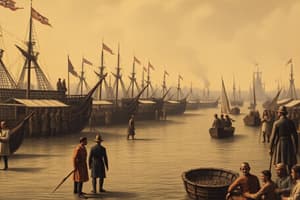Podcast
Questions and Answers
What is opium?
What is opium?
A narcotic from the poppy plant that found a market in China.
What crop was the basis of China's agricultural economy?
What crop was the basis of China's agricultural economy?
Rice.
What did the Treaty of Nanjing grant to Britain?
What did the Treaty of Nanjing grant to Britain?
The island of Hong Kong.
What was the Opium War?
What was the Opium War?
What are extraterritorial rights?
What are extraterritorial rights?
What was the Taiping Rebellion?
What was the Taiping Rebellion?
What is a sphere of influence?
What is a sphere of influence?
What was the Open Door Policy?
What was the Open Door Policy?
What was the Boxer Rebellion?
What was the Boxer Rebellion?
What is nationalism?
What is nationalism?
What was the Treaty of Kanagawa?
What was the Treaty of Kanagawa?
What was the Meiji era?
What was the Meiji era?
What was the Russo-Japanese War?
What was the Russo-Japanese War?
What is annexation?
What is annexation?
Who was Matthew Perry?
Who was Matthew Perry?
What was the Sino-Japanese War?
What was the Sino-Japanese War?
What is a caudillo?
What is a caudillo?
What is the Monroe Doctrine?
What is the Monroe Doctrine?
Who was Jose Marti?
Who was Jose Marti?
What was the Spanish-American War?
What was the Spanish-American War?
What is the Panama Canal?
What is the Panama Canal?
What is the Roosevelt Corollary?
What is the Roosevelt Corollary?
What is peonage?
What is peonage?
What role did Antonio Lopez de Santa Anna play in Mexico?
What role did Antonio Lopez de Santa Anna play in Mexico?
Who was Benito Juarez?
Who was Benito Juarez?
Who was Porfirio Diaz?
Who was Porfirio Diaz?
Who was Francisco Madero?
Who was Francisco Madero?
What was Francisco 'Pancho' Villa known for?
What was Francisco 'Pancho' Villa known for?
Who was Emiliano Zapata?
Who was Emiliano Zapata?
Who was Venustiano Carranza?
Who was Venustiano Carranza?
What was La Reforma?
What was La Reforma?
Flashcards are hidden until you start studying
Study Notes
Opium and Trade
- Opium is a narcotic derived from the poppy plant, becoming a significant commodity in the Chinese market.
- Rice served as the backbone of China’s agricultural economy, essential for sustenance.
Treaties and Conflicts
- The Treaty of Nanjing was established post-Opium War, transferring control of Hong Kong to Britain.
- The Opium War (1839-1842) highlighted the tensions between Britain and China over opium trade issues.
- Extraterritorial rights granted exemptions to foreign residents from local laws, affecting sovereignty.
Social Uprisings and Nationalism
- The Taiping Rebellion was a major uprising against the Qing Dynasty, driven by leader Hong Xiuquan's ideology.
- The Boxer Rebellion in 1900 was a nationalist uprising aimed at expelling foreign influence from China.
Economic Policies
- The Open Door Policy, proposed by the U.S. in 1899, aimed to ensure equal trading rights for all nations in China.
- A sphere of influence refers to regions where foreign nations exert control over trade and economics.
Japan's Opening and Modernization
- The Treaty of Kanagawa (1854) allowed U.S. ships to access Japanese ports, marking Japan's opening to the West.
- The Meiji era (1867-1912) was a transformative period for Japan, marked by rapid modernization under Emperor Mutsuhito.
Conflicts in East Asia
- The Russo-Japanese War (1904-1905) stemmed from competition for dominance in Manchuria and Korea.
- The Sino-Japanese War involved conflict between China and Japan over control of Korea.
Latin American Political Landscape
- Caudillos were military dictators who held power in various Latin American nations.
- The Monroe Doctrine (1823) opposed European interference in Latin America, asserting U.S. influence in the region.
Key Figures in Cuban Independence
- José Martí, an exiled Cuban writer, returned to initiate a renewed fight for Cuban independence from Spain.
- The Spanish-American War (1898) was fueled by U.S. support for Cuban independence efforts.
Infrastructure and Policy Developments
- The Panama Canal, completed in 1914, connected the Atlantic and Pacific oceans, facilitating maritime trade.
- The Roosevelt Corollary (1904) expanded the Monroe Doctrine, asserting a U.S. right to intervene in Latin American affairs.
Social Issues in Latin America
- Peonage was a debt system binding laborers to landowners, perpetuating cycles of poverty.
- Political leaders like Antonio Lopez de Santa Anna, Benito Juárez, and Francisco Madero played crucial roles in shaping Mexico’s political future.
Revolutionary Figures in Mexico
- Emiliano Zapata aimed to reclaim land for peasants, leading a significant revolutionary force against established leaders.
- Venustiano Carranza sought to power after Huerta, ultimately revising the Mexican constitution while navigating complex civil conflicts.
La Reforma Movement
- La Reforma was initiated by Benito Juárez focusing on land redistribution, church-state separation, and educational reforms for the poor.
Studying That Suits You
Use AI to generate personalized quizzes and flashcards to suit your learning preferences.




